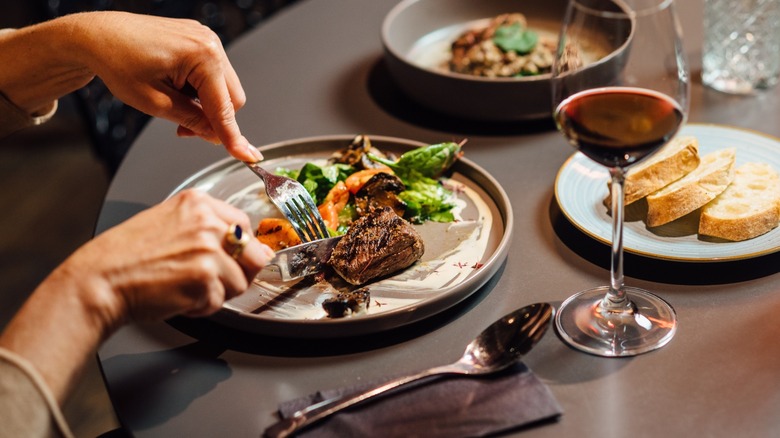The Type Of Restaurant Meal That Could Be A Red Flag
Celeb chef Gordon Ramsay already warned us about a restaurant red flag that relies on duping customers: a long list of "specials," which, in fact, are anything but. In that same vein, Foodie's sister site Tasting Table spoke with Madame Marie, a Toronto-area restaurant critic, about another way that eateries can bamboozle diners via the menu. This time, it was limited-time offers (LTOs), or limited quantities of dishes. Is this a manipulative tactic? "Absolutely," she confirmed, noting that restaurants that do this are trying to drum up sales. "The illusion of scarcity — 'only three orders left' — is a classic marketing device."
The concept of artificial scarcity (which is to say, a sense of urgency that has nothing to do with actual "specialness" or rarity of ingredients) is indeed a classic restaurant sales technique that's actually pushed by industry experts. Tapping into customers' innate FOMO is a psychological trick utilized at practically every stratum of the restaurant biz, including the viral pumpkin-spice handcrafted drinks at Starbucks and the McDonald's McRib (the meat of which is boneless pork), which tends to drop irregularly and create greater excitement when it randomly shows up.
This tactic goes all the way to finer dining, too. You might see restaurants offer meals in "limited" quantities that are tied to holidays, seasons, or cultural trends, with loaded disclaimers like "available while supplies last." Customers are particularly susceptible to this move on special occasions, like Valentine's Day (a huge dining-out holiday), where dishes may be suggested as "limited" or "premium" simply to move expensive stock such as steaks or desserts.
Look past marketing hype to identify genuinely special dishes
The trickery here, of course, is that there isn't actually a limit on pork shoulder or pumpkin pie spice, to say nothing of heart-shaped cakes, Dubai chocolate, or Taco Bell's Mexican pizza. There's a marked difference between dishes that are meant to drive traffic by artificially limiting quantities and dishes that are truly special. "True scarcity is born of craft: dishes requiring intensive preparation or seasonal ingredients," Madame Marie puts it succinctly.
For example, juicy sun-warmed Georgia peaches are only available in the balmy summer months. If a bistro offers a peach and burrata salad, that's a good example of a special that is truly time-limited, because those peaches won't be perfect forever. Another example at a higher-end restaurant is if the chef was able to source a shipment of locally caught seafood that isn't generally available. They can then offer it as the nightly special until it runs out. That is a meal that is actually in limited supply. At gourmet bakeries, you might see hand-crafted macarons that are only for sale until they run out, all because they require time, skill, and energy to bake perfectly.
On the other hand, those limited-time dishes that place a premium on unextraordinary ingredients merely to drive traffic should be avoided. That's because they will probably cost more for something that simply isn't a big deal. When in doubt, you can politely ask your waiter questions about the source of the special or even request to talk to the chef to get more info.
Static Media owns and operates Foodie and Tasting Table.

